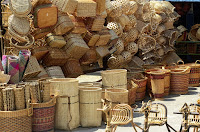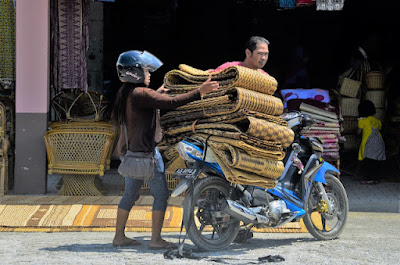
In Kuching last August I had a little window of opportunity to pay another visit to Serikin where the "Little Indonesia" is. We took to the road on a Friday morning to visit the little border town of Serikin. It is about less than an hour drive from Kuching city center. The road to Serikin is all paved and is very safe to travel even alone in your own car. Serikin is where Indonesians bring and trade their goods to Malaysian tourists and visitors. It would take about a day or less for Indonesians to travel by road to Serikin which sits on the Malaysian side of the Indonesian-Malaysian boundary line. Here trade in Indonesian made products are brisk and keep on expanding yearly. It seems to me that the place thrives due to private sector dynamism. Indonesians provide the goods that are produced at relatively cheap cost and sold to Malaysians in Malaysian currency. Transaction-wise, Malaysians are bound to benefit due to the high value of the ringgit ( Malaysian currency) vis-a -vis the Indonesian rupiah. At the same time Indonesians find a captive market for their products. But the attraction of Serikin lies also in its ample and wide range of products from household items, personal attire and accessories, food, furniture, handicrafts and souvenirs, herbal medicines, toys, etc. Today the sun was pouring its heat and the tiny road that tugs the stall on both sides were shied-away by visitors as they preferred to walk under the sheltered canopy of the stalls. Despite the heat I thronged together with hundreds of other eager Malaysians to savour a little of Indonesia. This place has turned out to be a well-patronised "Little Indonesia" on Malaysian soil.
 |
| Ethnic designs on textiles |
 |
|
|
|
 |
|
The rattan business is the main attraction at Serikin. In our local Malaysian culture especially among the natives, rattan is very much ingrained into their daily lifestyles. Rattans are used for ties or fasteners for scaffolding and timber building construction, strings for various purposes e.g. rafts, carrying baskets for industrial, domestic and personal uses, cultural artifacts, furniture, handicraft or souvenir items e.g. bangles, handbags, food covers, mats, chairs, fish traps,etc. Such is the versatility, robustness, and usefulness of this climbing palm species from the jungles of Kalimantan (Indonesia) and also Sarawak. You can be spoilt for choices. Rattan mats of varying sizes, patterns and material mixes ( e.g. rattan plus tree bark) catches up with Malaysian tastes and fads. The prevalence of these mats indicate the richness and sustainability of the rattan plants in Indonesia while in Malaysia these plants are a declining and dying species in large part due to conversion of virgin forests to oil palm plantations and acacia plantations for the production of pulp especially in Bintulu area.
 |
| A female supplier for rattan mats downloading her motorcycle fully loaded with folded rattan mats. |
 |
| A plate of krepek |
 |
| The wordings in Indonesian Malay indicate the type of chips available. "Bandung" is tapioca, "Pisang" means banana and "Keladi" is for yam. A packet above costs RM 5 . |
I tried some free samples of chips ( see inset) before I decided to take home a packet of spicy tapioca chips . On the plate were chips from the breadfruit, yam, banana and tapioca. They were all very crispy, tasty ,fried and without any preservatives. In Malaysia now there is a growing interest in the processing of chips as a cottage industry because the rural entrepreneurs produce the basic material plus many of them enjoy some micro -credit assistance from banks and other financing institutions. Many of them are eyeing the export of chips to overseas countries especially Arab nations where consumers are concerned with 'halal' food products and Malaysia is only one of the few Islamic countries that is pursuing 'halal' manufacturing hubs on a global scale. However, for export purposes the products are rigorously manufactured and packaged to meet international standards of quality, safety and longer shelf-life.
Needless to say, today was another fun outing to a gradually popular destination for visitors to Kuching city called "Little Indonesia", but sitting squarely on Malaysian soil.
Happy Malaysia Day Sarawak!
Note: This is Article #15 in a series to celebrate Malaysia's national day (Malaysia Day) - 16 Sept annually)







No comments:
Post a Comment